|
|
|
Sort Order |
|
|
|
Items / Page
|
|
|
|
|
|
|
| Srl | Item |
| 1 |
ID:
001916


|
|
|
|
|
| Publication |
Stanford, Stanford University Press, 1999.
|
| Description |
ix, 373p., figures,maps,tables
|
| Standard Number |
0804731918
|
|
|
|
|
|
|
|
|
|
|
|
Copies: C:1/I:0,R:0,Q:0
Circulation
| Accession# | Call# | Current Location | Status | Policy | Location |
| 043119 | 355.0310973/CHA 043119 | Main | On Shelf | General | |
|
|
|
|
| 2 |
ID:
175854
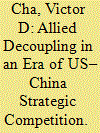

|
|
|
|
|
| Summary/Abstract |
The turn towards an openly competitive relationship between the United States and China today carries acute consequences for U.S. policy toward North Korea (Democratic People’s Republic of Korea or DPRK) and South Korea (Republic of Korea or ROK). The military and economic requirements of enacting such a policy of competition with China complicates U.S. policy with its ally South Korea, as it exacerbates three core dilemmas that the ROK contends with regarding China. These dilemmas compel choices for a U.S. ally that must increasingly become zero-sum in nature where Seoul must make choices that alienate its patron ally or its neighbor. This article draws out propositions for how changes in U.S.-China relations impacts strategy on both sides of the Korean peninsula. The primary finding is that changes in the independent variable (U.S.-China relations) have opposing impacts on South Korean and North Korean strategic thinking (dependent variable). What might be considered opportunities afforded by U.S.-China relations to South Korea are seen as threats by North Korea. Conversely opportunities created by U.S.-China relations for North Korea register as threats for South Korea.
|
|
|
|
|
|
|
|
|
|
|
|
|
|
|
|
| 3 |
ID:
082176
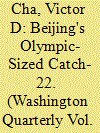

|
|
|
|
|
| Publication |
2008.
|
| Summary/Abstract |
The Olympic spotlight provides China with an opportunity to enhance its prestige, but also with massive pressures for political change that, if left unaddressed by Beijing, will undercut any benefits
|
|
|
|
|
|
|
|
|
|
|
|
|
|
|
|
| 4 |
ID:
052428
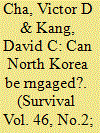

|
|
|
|
|
| Publication |
2004.
|
| Description |
p89-107
|
| Summary/Abstract |
Discussion of North Korea's nuclear programme and what to do about it has become ideological and emotionally charged. Convinced that good policy serving American and allied interests is unlikely to emerge from such a debate, Korea experts Victor Cha and David Kang decided to step back from the histrionics and engage in a reasoned, rational and logical exchange on the nature of the North Korean regime and the policy that should be followed by the United States, Japan, and South Korea. Their debate was published in book form as Nuclear North Korea: A Debate on Engagement Strategies (New York: Columbia University Press, 2003). Survival invited Cha and Kang to continue their debate in these pages.
|
|
|
|
|
|
|
|
|
|
|
|
|
|
|
|
| 5 |
ID:
103428


|
|
|
|
|
| Publication |
2011.
|
| Summary/Abstract |
This article argues that prospects for change in North Korea and, thus, reduction in threats to regional security, lay more in rising prospects for Korean unification than in scant hopes for reform inside North Korea. It identifies several factors that have made unification a more salient idea than at any time in the last decade. First, Kim Jong Il's failing health and his youngest son's and designated heir's uncertain grip on succession mean greater risk of political instability in North Korea that could bring discontinuous change, including reunification. Second, it has become clear that the Six Party Talks and other diplomatic efforts will not produce denuclearization and reduction of the regional security threat posed by Pyongyang's weapons program. Third, the current and likely future leadership in Pyongyang is incapable of reform, making regime collapse a more likely scenario and unification a more likely route to meaningful change. Fourth, the North Korean regime has become heavily dependent on Chinese support, material and political-diplomatic. Finally, thinking about how unification might occur has shifted to scenarios that are more feasible to key parties, including South Korea, the United States and Japan.
|
|
|
|
|
|
|
|
|
|
|
|
|
|
|
|
| 6 |
ID:
065600
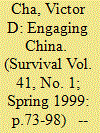

|
|
|
| 7 |
ID:
065594
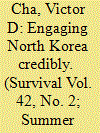

|
|
|
|
|
| Publication |
2000.
|
| Description |
p.136-155
|
|
|
|
|
|
|
|
|
|
|
|
|
|
|
|
| 8 |
ID:
144750
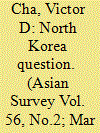

|
|
|
|
|
| Summary/Abstract |
The North Korean state under a young and unproven leader faces severe challenges. The regime will not change because of a leadership transition or because of the West’s hope of reform. It could crack because its ideology is at odds with the country’s incremental societal change.
|
|
|
|
|
|
|
|
|
|
|
|
|
|
|
|
| 9 |
ID:
112160
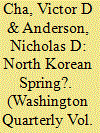

|
|
|
| 10 |
ID:
093027
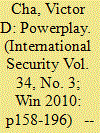

|
|
|
|
|
| Publication |
2009.
|
| Summary/Abstract |
In East Asia the United States cultivated a "hub and spokes" system of discrete, exclusive alliances with the Republic of Korea, the Republic of China, and Japan, a system that was distinct from the multilateral security alliances it preferred in Europe. Bilateralism emerged in East Asia as the dominant security structure because of the "powerplay" rationale behind U.S. postwar planning in the region. "Powerplay" refers to the construction of an asymmetric alliance designed to exert maximum control over the smaller ally's actions. The United States created a series of bilateral alliances in East Asia to contain the Soviet threat, but a congruent rationale was to constrain "rogue allies"-that is, rabidly anticommunist dictators who might start wars for reasons of domestic legitimacy and entrap the United States in an unwanted larger war. Underscoring the U.S. desire to avoid such an outcome was a belief in the domino theory, which held that the fall of one small country in Asia could trigger a chain of countries falling to communism. The administrations of Harry Truman and Dwight Eisenhower calculated that they could best restrain East Asia's pro-West dictators through tight bilateral alliances rather than through a regionwide multilateral mechanism. East Asia's security bilateralism today is therefore a historical artifact of this choice.
|
|
|
|
|
|
|
|
|
|
|
|
|
|
|
|
| 11 |
ID:
061269
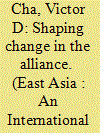

|
|
|
| 12 |
ID:
061108
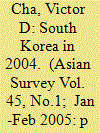

|
|
|
|
|
| Publication |
Jan-Feb 2005.
|
|
|
|
|
|
|
|
|
|
|
|
|
|
|
|
| 13 |
ID:
103626
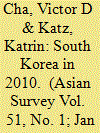

|
|
|
|
|
| Publication |
2011.
|
| Summary/Abstract |
For the Obama administration, unforeseen dynamics in East Asia over the past year have escalated the importance of the U.S.-ROK alliance to unprecedented levels for the United States. But the alliance remains vulnerable to external shocks, rendering the continuation of the current phase of unmitigated harmonious ties far from certain.
|
|
|
|
|
|
|
|
|
|
|
|
|
|
|
|
| 14 |
ID:
166006
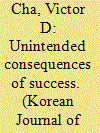

|
|
|
|
|
| Summary/Abstract |
Prudent leaders must always contemplate the unintended consequences of their foreign policy successes, particularly when those secondary consequences create negative externalities. In this article, I look at whether the unintended consequence of the South Korean government’s push for a peace declaration on the Korean peninsula could create the conditions by which the United States, led by an impulsive American president, could withdraw U.S. troops from the Korean peninsula. I first document the rationale behind the South Korean government’s approach to peace diplomacy with North Korea. I then examine the concept of the peace declaration, which is different from a ratiable treaty, and the “catch-22” of this declaration as it relates to denuclearization of the Korean peninsula. Finally, I analyze how a supercial peace declaration will not address core national security concerns of either ally, and how it could create unintended consequences with regard to troop drawdowns. This research features an original and unique dataset that documents Donald Trump’s transactional view of U.S. military commitments to its allies over the past three decades.
|
|
|
|
|
|
|
|
|
|
|
|
|
|
|
|
| 15 |
ID:
090954
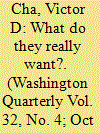

|
|
|
|
|
| Publication |
2009.
|
| Summary/Abstract |
We remained deadlocked over a particular clause in the document. Our counterparts across the table demanded language that we thought to be unacceptable. Yet, in an effort to move the already faltering negotiations forward, we agreed to send the language back to Washington overnight for approval. This was the fourth round of the Six-Party Talks in September 2005. The talks had been suspended previously for well over a year, and the Bush administration, in its second term, was reengaging in a way that the first term had not. At issue was the Democratic People's Republic of Korea's (DPRK) demand that we put into writing a statement of U.S. non-hostile intent. The clause in question stipulated that the United States "has no intention to attack or invade the DPRK with nuclear or conventional weapons."1 To my surprise, the language came back the next morning having been approved in Washington.
|
|
|
|
|
|
|
|
|
|
|
|
|
|
|
|
| 16 |
ID:
079081
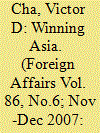

|
|
|
|
|
| Publication |
2007.
|
| Summary/Abstract |
Pundits, academics, and Bush bashers insist that the United States is losing ground in Asia, but they are wrong. The Bush administration's Asia policy has been an unheralded success. Improved relations with China, stronger U.S.-Japanese cooperation, North Korea's gradual nuclear disarmament, and expanding regional alliances have made Asia more prosperous and secure than it has been in decade
|
|
|
|
|
|
|
|
|
|
|
|
|
|
|
|
|
|
|
|
|